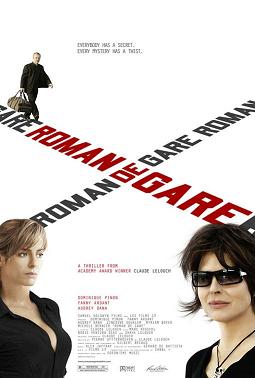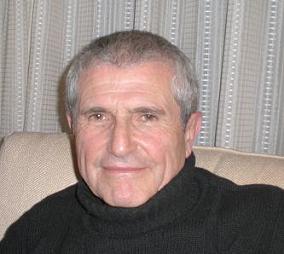
Main Page
Interviews Menu
Alphabetical Menu
Chronological Menu


Claude Lelouch writes and directs Roman de Gare a mystery thriller about Pierre (Dominiqe Pinon), a mysterious ghost-writer for novelist Judith Ralitzer (Fanny Ardant), who offers a ride to a woman (Audrey Dana) abandoned on the road while coming up with ideas for his next book. Meanwhile, there's a serial killer on the loose and authorities question Judith about her ghost writer. Thus begins an intricate plot full of surprises and twists. Claude Lelouch has previously directed And Now..Ladies and Gentlemen and, most famously, A Man and a Woman back in the 1960s. Now, at the age of 70, he's still as sharp, bright and energetic as ever. I had the privilege to interview Claude Lelouch. Samuel Goldwyn Films releases Roman de Gare on April 25th, 2008 at the Angelika Film Center and Lincoln Plaza Cinemas. NYC MOVIE GURU: How would you describe your filmmaking style? CC: Iím the one filming all of my films, behind the camera [and editing]. I take care of each step of [the process]. I make my films like an amateur filmmaker wouldóI do everything. [Also], in my films, there arenít good guys and bad guys. The good guys become bad guys and [vice versa]. Itís sort of like the weather. Some days, itís nice and some days itís bad. If you look at each of our lives, weíve all done things that were wonderful and things that were less so. Weíve all thought once about killing someone and about the perfect crimeóG_d being the greatest serial killer of all time since he kills everyone and succeeds in committing the perfect crime each time. NYC MOVIE GURU: Why do you combine so many different genres in Roman de Gare? CC: I love films that combine genres because life is a combination of genres. I try to make films that resemble life. All of my films are combinations of genres, maybe this one more so than others. I try to make films that resemble what I see in life. If, one morning, someone steals my wallet, then itís a thriller. If I then go into a restaurant and see a pretty women, then it becomes a love story. Itís the whole mixture [of genres] that makes the charm of this movie. Itís what people like or hate in my movies. People have often criticized it, [but] itís what I stand by. Iíve been fighting in support of it for 50 years. NYC MOVIE GURU: How did you come up with the filmís intricate plot? CC: Itís a very complicated question because itís very natural for me. Life is a puzzle, so my point of departure was true stories. There are several stories in this movie and each of them is true. For a long time, I wanted to denounce the impostor of literature because so many best sellers are written by ghost writers. Itís a true problem in the literary field which also exists in that world because there are two people involved. In the world of cinema, itís impossible because there are a hundred people or so. I also wanted to explore peopleís Machiavellian qualities because the hero, [played by] Domique Pinon, is the most Machiavellian of all. He seems really nice on first appearance, but heís the one who kills Judith Ralitzer. Heís the one who uses her in order to make sure his book is a success. The purist character is Judith Ralitzer. Itís a film about paradoxes and lies. Everybody is lying in the film. Lies are very important in life and theyíre more useful than truths. Itís fortunate that lies exist because truth is only meant for people who are beautiful, healthy and rich. Truth is a luxury that no one can afford. How would the people with the fewest means to live be able to survive without resorting lies? Lies are what humanity uses most frequently to progress. Iím sort of doing an apology of the lie. Lies are what bring us to truth. All artists begin by lying in order to reach truth. Lies are like taking a loan out at the bank. You do have to pay it back with interest. Thatís whatís interesting [to me]. NYC MOVIE GURU: Why is important for you to trick the audience in your films? CC: When the audience goes to the cinema, itís to be entertained. So, I play a game between myself and the audience. I try to transform the audience into an actor. I think itís more fun for an audience to get into the film rather than to just watch it. When I A Man and a Woman, the audiences wasnít just watching a love story; they were experiencing it. Thereís a big difference between watching a film and experiencing it. NYC MOVIE GURU: Why do you often have characters riding in cars in your films? CC: Since A Man and a Woman up until now, Iíve always been fascinated by cars. Itís like a horse in Western films. Cars are the place where I feel the most comfortable because I can be alone and see others. Iíve written all of my films in cars. Itís my office. I leave my family, my things, everybody and I take off for 5 or 6 thousand kilometers all alone with my recorder. I write all my stories like that. I canít write it in an office [because] I canít write in a calm place. In the car, Iím alone, but with others at the same time. I see life, I see landscapes and action. Thatís what my temperament is all about. Iím a man of action, [so] I need to move. I drive better when Iím driving fast. When Iím driving slowly, I canít drive anymore. When I wrote Roman de Gare I [drove] from Paris to Rome and back. Once I was back in Paris, the script was written. NYC MOVIE GURU: How much information did you give each actor about the plot? CC: Each actor only knew his or her own part and didnít know the othersí parts. If they had read the entire script, they wouldnít have acted it in the same manner. They had to also be surprised. Domique Pinon did know a lot of things, [though]. The actors find out about the important bits of information while the camera is rolling. NYC MOVIE GURU: Why did you choose Domique Pinon as Pierre? CC: First and foremost, I was looking for someone without an easy appearance. Itís sort of a film about the guilt of having an ugly face. Above all, I had to make sure that the audience could never figure out the ending of the story. Dominique Pinon had a seductive appearance. The film wouldnít have the same feel to it if I had cast Julia Roberts and Brad Pitt. An ideal film should always use brand new actors each time. Actors should only be used once. NYC MOVIE GURU: Would you consider yourself to be internet-savvy? CC: Iím not a scientific person; Iím an artist [who] prefers working based on my memory, but not on other peopleís memories. Itís not my generation, either. I like working based on my observations. I like for my stories to be based on characters Iíve met, [which is] why I travel a lot. I prefer real traveling rather than traveling via the internet. The travel through the internet is full of frustrations and I enjoy finding things Iím not looking for. I like meeting people like that. When I was writing Roman de Gare, there was an abandoned woman on the side of the street and I actually saw her. I witnessed this scene and that I donít think I would have found on the internet. [However], all of my assistants [do] use the internet. NYC MOVIE GURU: What have you learned throughout the years as a filmmaker? CC: Since Iím self-taught and learned about cinema on my own, every time I make a film, Iím going back to school. Iíve gone back to school forty-one times. I hope to go back to school many times. I learn many new things with each new film. Normally speaking, my last film should have been my best. NYC MOVIE GURU: Who are some of your favorite film directors and why? CC: I like it when the film director isnít the screenwriterís slave. Nowadays, film directors have become the slave of the producer, stars and screenwriters. Thatís why I like Woody Allen and [John] Cassavetes. I like directors who write their own stories and cinema where thereís no intermediary in which the author is speaking directly to the audience. In contemporary cinema, there are too many intermediaries. There are too many films that could be made by twenty directors and nothing would change in them. All the studio films could be made by just about anyone. Thankfully, thereís independent cinema. NYC MOVIE GURU: Has filmmaking always been your inevitable path in life? CC: Yes, I was doomed to it. When I was born, my father bought a little camera to film my birth. So, the first thing that I saw when I came out of my motherís womb was a camera. Main Page Interviews Menu Alphabetical Menu Chronological Menu ______________________________________________________ |
The NYC Movie Guru
themovieguru101@yahoo.com
Privacy Policy